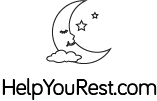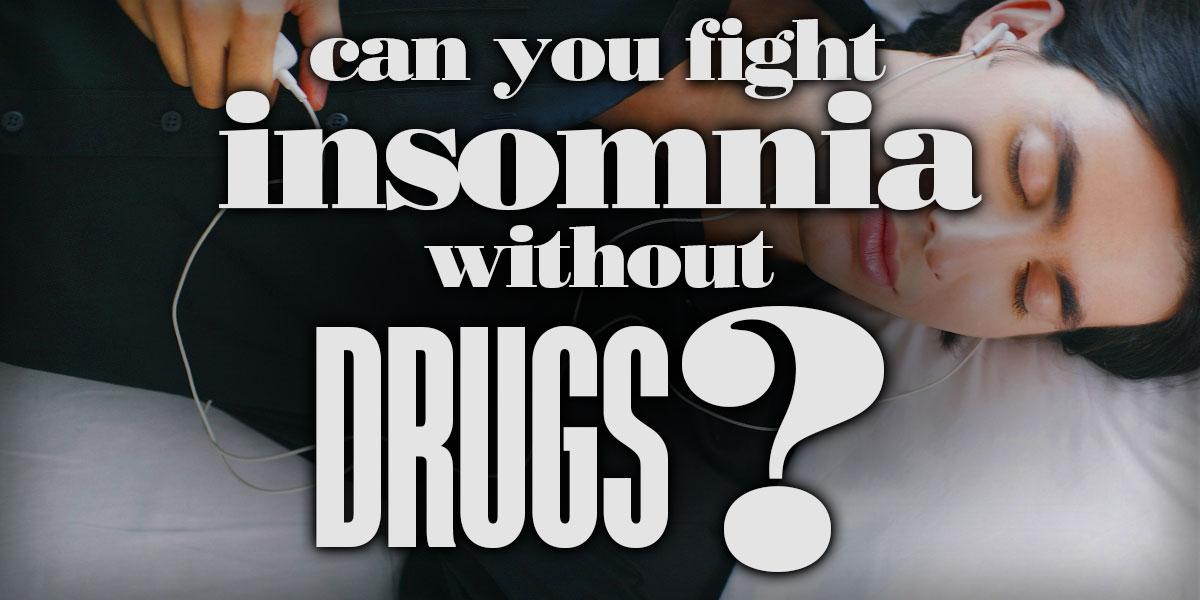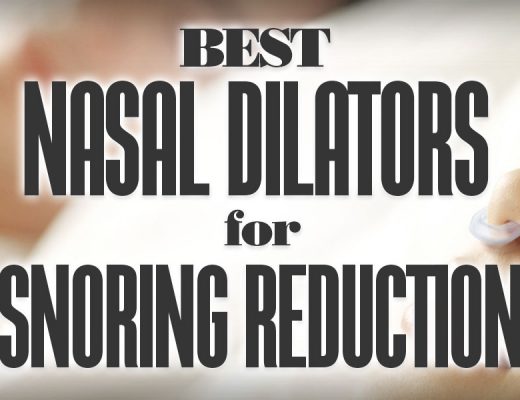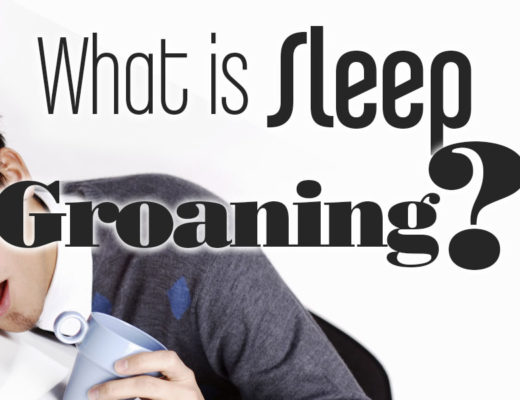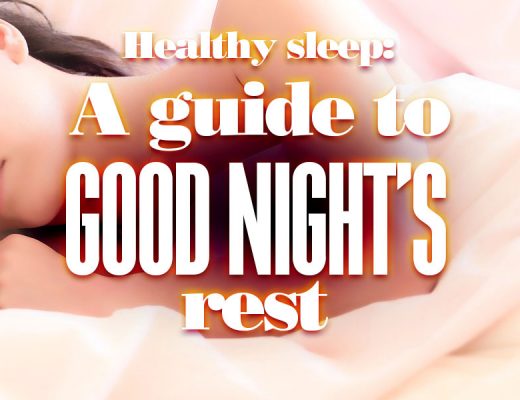In 2018, a Wakefield Research study revealed that 51% of adults around the world aren’t getting enough sleep, drawing greater attention to the ongoing issue of sleep health and insomnia. While some people may recognize the source of the issue and seek a remedy in prescription or over the counter medications, others are hesitant for one reason or another. When looking for alternative treatments, though, it’s important to know what methods work before you try them.
Can you treat insomnia without medication? Not only is it possible, but in some cases, it may even be preferred by a patient or their doctor. Some of the most effective remedies are a simple matter of changing your habit or routine.
In this article, we’ll take a closer look at what insomnia is, how it impacts your life; how you can treat it naturally, and why you may want to consider doing so. As always, while we’ve carefully researched our piece; you should discuss any changes or treatments you want with your medical care provider before pursuing them. With that out of the way, let’s begin.
What Is Insomnia?
Most of us have a very basic understanding of what insomnia is: difficulty falling asleep. While this simplistic definition isn’t wrong, it’s not wholly correct, either. Insomnia, as defined by the medical community, is a disorder with many different symptoms.
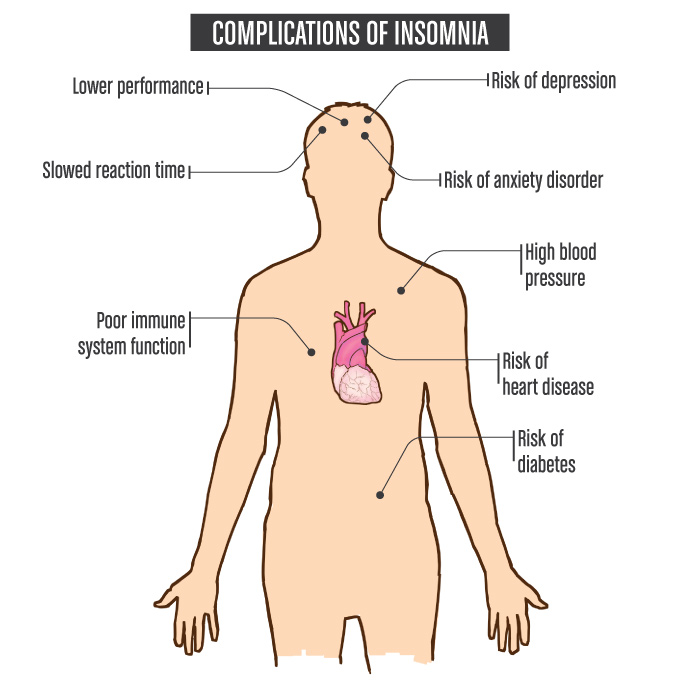 Insomnia itself isn’t just about difficulties in falling asleep. If you are unable to stay asleep or find yourself waking up frequently or too early in the morning, you may very well be suffering from the disorder. It can last for a few days or be an ongoing experience. The former is classified as acute and the latter as chronic.
Insomnia itself isn’t just about difficulties in falling asleep. If you are unable to stay asleep or find yourself waking up frequently or too early in the morning, you may very well be suffering from the disorder. It can last for a few days or be an ongoing experience. The former is classified as acute and the latter as chronic.
When you look at it in those terms alone, you realize that most people have experienced insomnia at least once. It’s usually in the acute form since it lasts for only a short period. As such, it tends to go unnoticed, a problem that’s made worse by a lack of professional diagnosis. After all, why would you go to see your doctor over a couple of restless nights?
The medical community further divides insomnia into two distinct types based on whether it’s caused by a separate health issue or not. If it can be linked to another problem, like diet, it’s called secondary insomnia. If it doesn’t have an outside source, it’s instead called primary insomnia.
To return to the original question, yes, insomnia is difficulty falling or staying asleep, or getting enough sleep at all. But as you dig deeper past the surface of this simple definition, you find that, much like other sleep disorders, it gets more complicated than that. Primary and secondary insomnia can be broken down even further into other, less common classifications, but we won’t be discussing them in this piece.
More About Primary Insomnia
If your insomnia can’t be tied back to a medical condition, be it physical or mental, it’s primary insomnia. Think of it as external, environmental factors: loud neighbors, snoring housemates, or environmental noise. What most of the underlying sources have in common is that they are seemingly out of your control.
Primary insomnia can also be linked to substance use, which can occasionally cause some confusion when making a diagnosis. Alcohol and drug abuse, while usually seen as mental health issues, are none-the-less treated as causes of primary insomnia.
Finally, habits and routines play a role. Prescribed medications with disruptive side-effects, using electronics too close to bedtime, and late-night shifts are also factors in primary insomnia.
More About Secondary Insomnia
If your restless nights or poor sleep can be linked to a physical or mental condition; your insomnia is considered secondary. Think of how anxiety or joint pain can keep you from drifting off or force you to wake up; and you’ll understand how it works. Because these factors are usually medical, treating insomnia requires treating the root problem, hence the “secondary” moniker.
In some ways, secondary insomnia can be more difficult to recognize than primary because the root cause is so distracting. This is especially true when dealing with anxiety or depression; which can cause you to focus on other problems entirely and go undetected themselves. That’s why it’s important to document how these issues impact every part of your life; including your sleep habits, when describing them to your doctor.
Myths and Misconceptions
Because insomnia is fairly common, and even more people suffer sleep difficulties in general; numerous misunderstandings are surrounding what is and isn’t insomnia, how to diagnose it, and how to treat it. The prevalence of insomnia among adults has led to some of these myths being accepted as absolute fact.
Insomnia myths are particularly dangerous for two reasons. First, some of them cause those suffering from the disorder to think they don’t have it by defining it incorrectly. Second, they sometimes offer cures or treatments that are not only ineffective but can make symptoms worse. Before we dig into some of the natural ways you can treat insomnia, let’s correct these lingering misconceptions.
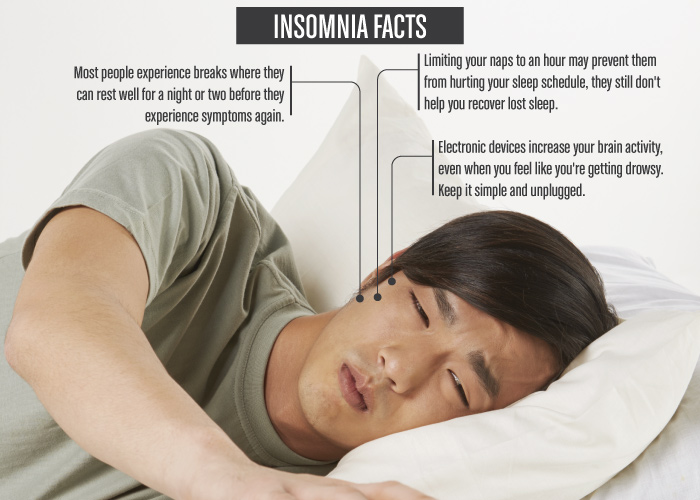
Your Body Will Eventually Adapt to Poor Sleep
This is perhaps the most dangerous insomnia myth out there. Your body needs a certain amount of sleep a day; and how much it needs changes as you age, but it simply doesn’t adapt to not getting enough quality sleep. You may think you’ve learned to cope with it, but you’ll still suffer.
Though the idea that you’ll simply make do without quality sleep is patently false; there is a small kernel of truth to it, after a fashion: When you’ve been living with insomnia for a while, your body learns to anticipate it. However, this isn’t exactly a good thing: it means that eventually; it will forgo preparing for sleep by skipping over key steps, reducing sleep quality.
If It Doesn’t Last for X or More Days, It Isn’t Insomnia
Though there are some very loose guidelines, there aren’t hard and fast rules for how long sleeplessness must last before it can qualify as insomnia, hence the chronic and acute definitions. Whether it’s short-term or long-term, the key is that it must be recurring. Which brings us to another important point:
It Needs to Be Continuous
Insomnia doesn’t have to occur every single night. The majority of the forms don’t. Most people experience breaks where they can rest well for a night or two before they experience symptoms again.
Napping Can Offset the Harm of Insomnia
Napping may make you feel more energized, but don’t make the mistake of thinking it’s a replacement for your nightly sleep routine. Think of it this way: a nap here or there, or sleeping in once in a while, only offers temporary relief from sleep deprivation. While it’s true that limiting your naps to an hour may prevent them from hurting your sleep schedule, they still don’t help you recover lost sleep.
Movies and Video Games Can Help You Sleep
If you’re struggling to nod off in bed, the last thing you need electronic entertainment. Devices like smartphones, tablets, computers, and televisions increase your brain activity, even when you feel like you’re getting drowsy. If you feel you need to engage in an activity to get back to sleep, keep it simple and unplugged.
9 Signs You May Have Sleep ApneaWhy Treat Insomnia Without Medicine?
The next time you’re at the pharmacy, take a moment to browse the shelves and note all of the sleep aids available over the counter. You probably won’t be surprised by the number you find or the different forms they come in. They’ve become a regular component of our medicine cabinets, always in reach alongside pain relievers, bandages, and other first-aid tools.
Sleep aids can be effective in helping you sleep, but they do not treat or cure insomnia itself. In essence, you’re treating the symptoms temporarily while the disorder continues unchecked. You may be getting sleep with the help of medication, but you’ll still have to deal with what’s at the core of your insomnia (as well as some of the disorder’s negative effects).
Looking at medication to kick sleepless nights may also expose you to dependency. Though a lot of attention recently has focused on prescription medications; the truth is you can develop a dependency on any medication, regardless of its classification. And then there’s the potential for other hazardous side-effects to cause even more trouble.
Ironically, sleep aids can further disrupt your sleep. If you aren’t on a regular sleep schedule already; they could leave you feeling less rested by only providing you with a shallow sleep that’s easily disturbed.
With all of that being said, don’t outright reject the possibility of using sleep aids if your doctor recommends them; but make sure you have realistic expectations of what they can do for you.
Treating Insomnia Naturally
Because some forms of insomnia have an underlying cause; you should seek professional help to determine the best way to treat the disorder. That being said, there are ways that you can treat the impact insomnia has on your waking life that are simple matters of habit. Not only can they help you achieve more restful sleep, but many of them are part of good sleep hygiene. If you make them part of your regular bedtime routine, you should see an improvement in your overall sleep health.
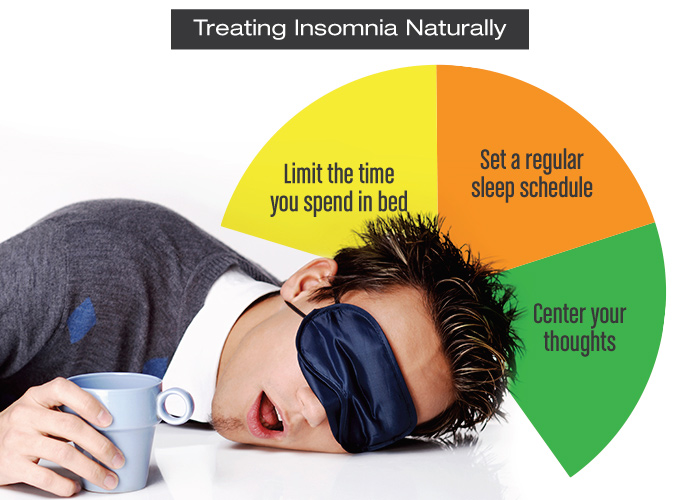
Limit the Time You Spend In Bed
If you’re like most people; you’re guilty of using your bed as a substitute for your couch, desk, kitchen table, or chair some of the time. While it may seem harmless to spend a few hours stretched out on the mattress working or watching television; doing these activities in bed can lead to your mind being unable to relax once you try to sleep. Besides avoiding these things; you should also get out of bed if you wake up and can’t get back to sleep quickly.
Set A Regular Sleep Schedule
This may sound strange if you’re already having trouble falling and staying asleep, but you have to remember that habits are very powerful things, so much so that they can change our behaviors. In this instance, the term “sleep schedule” refers to when you’re in bed preparing for sleep and when you wake up. Since you’re in control of when you decide to get in bed, you only need an alarm clock to finalize your schedule.
The goal is to train your body to recognize when you’re trying to sleep by getting into and out of bed at the same time every day. It’s especially important to wake up at the same time every day, even if you experience restless nights.
Center Your Thoughts
Do you ever find your mind racing as you lie awake under the covers? It’s an extremely common experience for those of us who live with depression, anxiety, and similar conditions. Once a worry takes hold, and you start ruminating; it can spiral out of control and put your body on high alert.
Learning to take control of and recenter your thoughts is one of the focuses of cognitive-behavioral therapy (CBT); which is widely used in treating insomnia. A basic tool of CBT is slow, controlled breathing. If you find that you can’t stop thinking when you should be sleeping; try this exercise: breathe in through your nose slowly for four seconds, hold it for four seconds; and breathe out of your mouth for eight. Repeat the process for a few minutes.
While you’re doing this, focus on the physical sensation of the air entering and exiting your lungs. As you continue to inhale and exhale, you should notice your body—and your thoughts—relaxing. That’s because breathing slowly like this helps to de-stress you physically and mentally.
There are many exercises like these that can help curb the effects of insomnia on your life; and using them regularly may help you get more sleep at night, but don’t try to tackle the problem alone. Your healthcare provider is in the best position to support you to kick insomnia with or without drugs.
